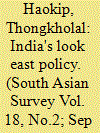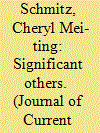| Srl | Item |
| 1 |
ID:
131995


|
|
|
|
|
| Publication |
2014.
|
| Summary/Abstract |
Within the scholarly debate on the current power transition in the international system, particular importance is attached to China's economic rise and the global shifts it is bringing forth in material primacy. A thorough understanding of these shifts in the relative distribution of power, however, requires leaving the narrow path of material capabilities and looking at normative accounts as well. Taking up this challenge, the article focuses on the political dimension of China's rise by exploring the country's alignment with South American governments along two dimensions: the convergence of their foreign policy ideas and the provision of diplomatic links facilitating their cooperation and coordination in global politics. The empirical analysis depicts a nascent global agenda forming between China and certain South American countries and shows that, along with growing levels of foreign policy compatibility, China has also advanced its diplomatic inroads into the region, particularly at the level of bilateral relations. Taking these developments as a whole, it is suggested that China has gained international attraction in terms of its visions of global order and as a potential political partner throughout the region. The article concludes with a discussion of the findings in light of the ongoing relative shifts in the distribution of global power beyond material primacy, and the prospects for China's further political rise.
|
|
|
|
|
|
|
|
|
|
|
|
|
|
|
|
| 2 |
ID:
127682


|
|
|
|
|
| Publication |
2011.
|
| Summary/Abstract |
The Look East policy has emerged as an important foreign policy initiative of India in the post-Cold War period. It was launched in 1991 by the Narasimha Rao government with the aim of developing political contacts, increasing economic integration and forging security cooperation with countries of Southeast Asia. The policy marked a shift in India's perspective of the world, with the strategic and economic importance of Southeast Asia to India's national interests being recognised. The second phase, which began in 2003, extends the coverage of the Look East policy from Australia to East Asia, with Association of Southeast Asian Nations (ASEAN) as its core. The new phase thus marks a shift in focus from trade to wider economic and security cooperation, political partnerships, physical connectivity through road and rail links. In this article, the evolution of India's Look East policy and its recent approach are analysed.
|
|
|
|
|
|
|
|
|
|
|
|
|
|
|
|
| 3 |
ID:
130284


|
|
|
|
|
| Publication |
2014.
|
| Summary/Abstract |
The sense of mystery around Chinese presences in Angola impels researchers to understand not only the empirical details of economic transactions and diplomatic partnerships but also the various ways in which the actors involved make sense of a novel social, political, and economic configuration. By drawing several ethnographic portraits of the social practices and discursive strategies at play in Chinese-Angolan relations, I show how, in a context of mutual uncertainty and suspicion, appeals to "security" play a central role. Instead of viewing Chinese and Angolans as two separate groups with opposed interests and lack of communication between them, I explore how participation in a shared context generates common modes of explanation. Moreover, I propose a parallel analysis of state-level negotiations alongside everyday social encounters to consider how a political economic partnership between China and Angola is lived through the everyday negotiations of Chinese and Angolan residents in Luanda.
|
|
|
|
|
|
|
|
|
|
|
|
|
|
|
|